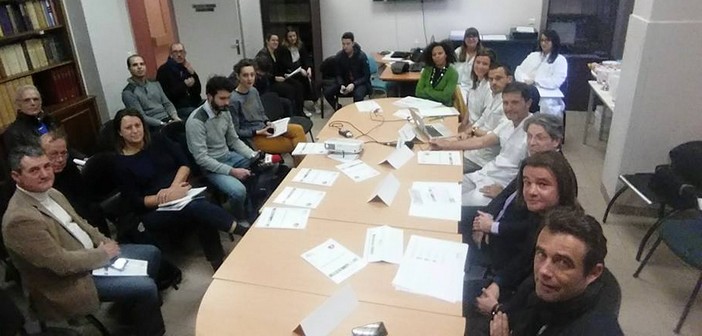Yesterday morning, the official presentation of the sports cardiology center took place at Pasteur 1 Hospital. A new consultation program dedicated to high-level athletes.
Emmanuel Bouvier-Muller (General Director of CHU of Nice), Patrick Baqué (Dean of the Faculty of Medicine), Olivier Guérin (Head of the Geriatrics Department at CHU of Nice), Emile Ferrari (Head of the Cardiovascular Thoraic and Metabolic Department) and José Cobos (Deputy for sporting events and the foundation in favor of sports and culture): All were present yesterday morning at Pavilion I of Pasteur 1 Hospital for the official presentation of the new Sports Cardiology Center. With the creation of this consultation unit, CHU of Nice becomes the fourth CHU in France and the only one in the PACA region to open a Sports Cardiology Center.
The creation of this center is not by chance, quite the opposite. While some consider sport a leisure activity, others have made it their profession. Practicing sports at a high intensity becomes dangerous when not monitored. In France, and according to a study by the “European Journal of Preventive Cardiology 2015,” 1500 sudden deaths per year occur during or immediately following intense physical activity. Identifying risk situations and preventing cardiovascular accidents are therefore a public health priority.
This is why Professor Emile Ferrari and his team, including Doctor Didier Scarlatti (part-time Hospital Practitioner at CHU of Nice) and Priscille Bouvier (Hospital Assistant), embarked on this project. The aim is to set up a specialized consultation program for high-level athletes, with cardiologists experienced in sports medicine, each having a “sub-specialty” in different cardiac issues that may concern athletes. Cardiovascular thoraic and metabolic for Professor Ferrari, sports rhythmology for Doctor Didier Scarlatti, and vascular diseases and sports for Priscille Bouvier.
A project based on prevention and monitoring, as Emile Ferrari explains: “Our mission is to eliminate all heart problems for people who want to practice sport at a high level. We also monitor, particularly cardiac patients who want to continue exercising at high intensity. There are more and more people aged 40-50 who have already had a small cardiac problem and want to maintain significant physical activity. This is the kind of situation where we can intervene.”
“Sport does not create heart disease, it reveals it”
And to successfully carry out these follow-ups and reach accurate diagnoses, the center is equipped with a wide range of tools. One of the strengths of this new consultation unit. However, the main advantage remains the presence of cardiologists experienced in sports medicine. That’s why all cases are discussed in consultation meetings for a collective opinion. There is also strong collaboration with Professor François Carré from the initiating center of sports cardiology in Rennes, especially for very complex cases.
Nothing is left to chance, and all opinions count. A definite advantage for reaching the right conclusions, especially psychologically, as Emile Ferrari points out: “We must consider the psychology of an athlete, it is a crucial concept. We cannot stop a high-level athlete because we have a small doubt about an examination. We should not expose them to a risk of sudden death if there is a real anomaly, but we should not stop them too quickly in case of doubt either. Nor can we stop a 15-year-old athlete who might have a promising sports career ahead because of a doubt; we need to go further than that. The repercussions, especially psychological, can be very significant for some athletes.”
Professor Ferrari also took the opportunity to praise the benefits of sport and specify the responsibility of sports practice on heart diseases: “Sport does not create heart disease, quite the contrary, it reveals it. Exercising is always beneficial, it enhances survival whether you are cardiac or not. Practicing 20/30 hours of training per week constitutes major physical stress. So when you have a heart disease that hasn’t made itself known, it can suddenly surface at a time of significant physical stress. This is what explains sudden deaths among athletes.”
The opening of this center is precisely aimed at reducing sudden deaths related to intense physical activity. Good news for high-level athletes who will be able to practice their sport more serenely than usual.


